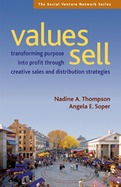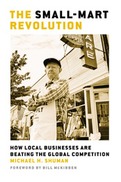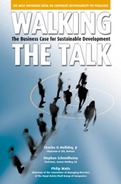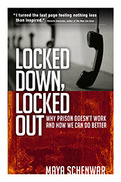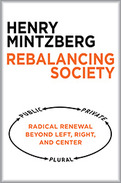2007
- Presents practical, detailed advice for developing innovative sales and distribution strategies
- Features examples from companies such as Tom's of Maine, Seventh Generation, Honest Tea, and many others
But in The Small-Mart Revolution, Michael Shuman shows that the benefits these mega-stores and huge corporations supposedly deliver to communities are illusory. Crunch the numbers and you'll find that locally owned businesses turn out to be much more reliable generators of good jobs, economic growth, tax dollars, community wealth, charitable contributions, social stability, and political participation. Unlike their global competitors, they do this without massive tax breaks and subsidies that often put local economies in a permanent hole. Plus, contrary to popular belief, local businesses are competitive with the multinationals--and gaining ground every day. Shuman highlights numerous trends that are making the old "bigger is better" economies of scale argument obsolete, and he describes a variety of innovative strategies these businesses are using to successfully compete with their over-sized competitors. He also shows how consumers, investors, and policymakers can support their own communities by "going local." The Small-Mart Revolution offers a robust alternative to "go-go" globalization, one that nurtures the creative capacities of local businesses and enables communities everywhere to thrive.
- Shows exactly why locally owned businesses are far more beneficial to their communities than massive chains like Wal-Mart
- Outlines specific strategies small and home-based businesses are using to successfully outcompete the world's largest companies
- Advises consumers, investors, policymakers, and organizers on how they can support the the local entrepreneurs who contribute to their communities
Hazel Henderson provides a survival guide for our ride on the "tiger of change," offering new directions and expanded contexts for creating patterns of operation based on win-win models and a new planetary culture. She provides numerous examples of the new paradigm and outlines concrete steps toward it, including the use of renewable resources and chaos systems theory, the greening of social policy, and the pursuit of sustainable, gender-balanced development.
Hazel Henderson provides a survival guide for our ride on the "tiger of change," offering new directions and expanded contexts for creating patterns of operation based on win-win models and a new planetary culture. She provides numerous examples of the new paradigm and outlines concrete steps toward it, including the use of renewable resources and chaos systems theory, the greening of social policy, and the pursuit of sustainable, gender-balanced development.
2002
Stephan Schmidheiny, author of the hugely influential Changing Course, has joined with fellow prime movers in the World Business Council for Sustainable Development-Chad Holliday of DuPont and Philip Watts of Royal Dutch/Shell-to spell out the business case for addressing sustainable development as a key business strategy.
The authors insist that a global partnership-between governments, business and civil society-is essential, if accelerating moves towards globalization are to maximize opportunities for all, especially the world's poor. They argue that far more eco-efficient and socially equitable modes of development must be pursued in order to allow poorer nations to raise their standards of living.
To achieve these aims, the book explains that markets must be mobilized in favor of sustainability, leveraging the power of innovation and global markets for the benefits of everyone. Business cannot succeed in failing societies.
Whether small, medium or large, all businesses must innovate and change to meet the social and environmental challenges of the coming years. Walking the Talk provides proven strategies for doing just that, and real-world examples of business leaders who are becoming a leading force for change-improving both their own bottom lines and quality of life for future generations around the world.
- The most important book on corporate responsibility yet published
- Written by top corporate leaders Chad Holliday, Chairman and CEO, DuPont; Stephan Schmidheiny, Chairman, Anova Holding AG; and Philip Watts Chairman of the Committee of Managing Directors, Royal Dutch/Shell Group of Companies
- A publication of the World Business Council for Sustainable Development which includes members from 160 of the largest and most influential companies from around the world including: AOL Time Warner, AT&T, Bayer, BP, Coca Cola, and Dow Chemicals (see attached list at the end of the EFS for full listing)
- Uses nearly 70 case histories of companies from around the world to show that good corporate social and environmental performance is an investment which will improve the bottom-line
- Argues that a further liberalization of the global market is the best way to alleviate third world poverty and encourage corporate responsibility
- Explores, in depth, the three pillars of sustainable development: economic growth, ecological balance, and social progress
- The authors are key insiders who show how to mobilize markets in favor of sustainable development
- Copublished with Greenleaf Publishing
2014
With the collapse of the communist regimes of Eastern Europe, Western pundits declared that capitalism had triumphed. They were wrong—balance triumphed. A healthy society balances a public sector of respected governments, a private sector of responsible businesses, and a plural sector of robust communities. Communism collapsed under the weight of its overbearing public sector.
Now the “liberal democracies” are threatened—socially, politically, even economically—by the unchecked excesses of the private sector.
Radical renewal will have to begin in the plural sector, which alone has the inclination and the independence to challenge unacceptable practices and develop better ones. Too many governments have been co-opted by the private sector. And corporate social responsibility can't compensate for the corporate social irresponsibility we see around us “They” won't do it. We shall have to do it, each of us and all of us, not as passive “human resources,” but as resourceful human beings.
Tom Paine wrote in 1776, “We have it in our power to begin the world over again.” He was right then. Can we be right again now? Can we afford not to be?


